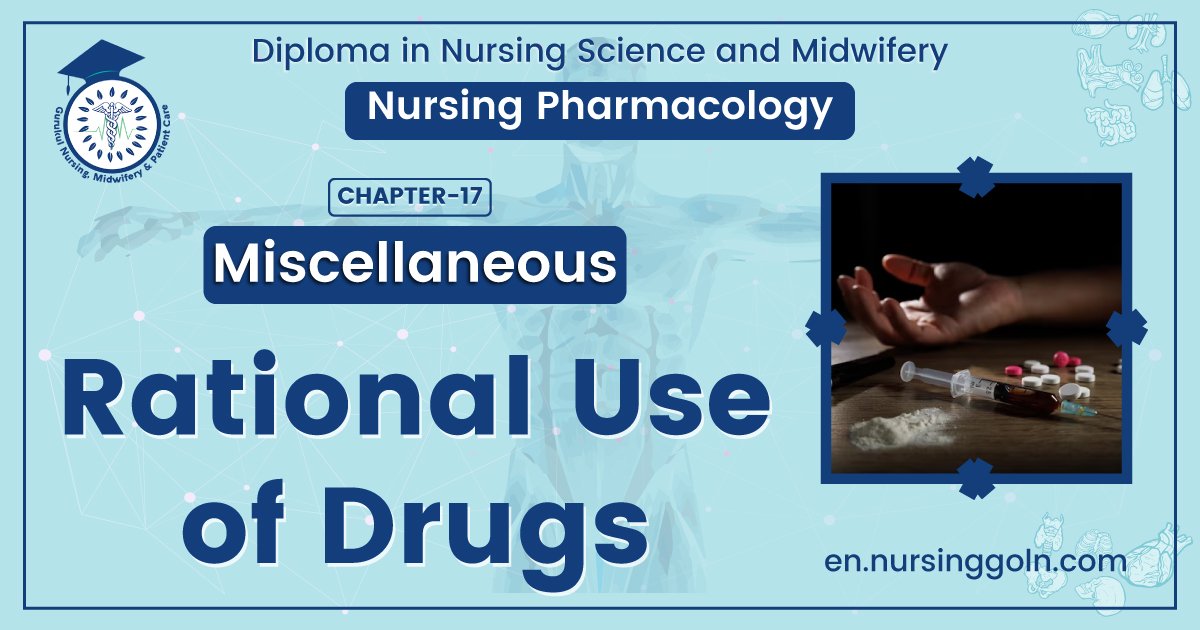Rational Use of Drugs – This book covers the entire syllabus of “Pharmacology” prescribed by BNMC- for diploma in nursing science & midwifery students. We tried to accommodate the latest information and topics. This book is an examination setup according to the teachers’ lectures and examination questions.
At the end of the book, previous questions are given. We hope in touch with the book students’ knowledge will be upgraded and flourish. The unique way of presentation may make your reading of the book a pleasurable experience.
Rational Use of Drugs
According to WHO, rational use of medicines requires that “patients receive medications appropriate to their clinical needs in doses that meet their own individual requirements for an adequate period of time and at the lowest cost to them and their community” It involves the administration of right drug, right dose, right duration, and right cost to the right patient.

Criteria of assessing rational use of drug
1. Only the essential drugs should be prescribed (decide whether the drug is really necessary or not at all).
2. Prescribe the effective preparation (selected drug) which provides expected therapeutic benefit.
3. Prescribe it at the right time.
4. Quantity of the drug should be enough.
5. Patient compliance: The patient should follow the instructions of the physician.
6. Prescribe easily available ones.
7. Prescribe a cost-effective drug.
Irrationalities in prescribing
1. Unnecessary use of drugs, e.g. antibiotics for viral infections.
2. Drug not prescribed as per standard treatment guidelines’
3. Underuse of drugs, e.g. not prescribing oral rehydration solution in acute diarrhoea.
4. Incorrect use of a drug, e.g. selection of wrong drug, use of incorrect route and dose of a drug.
5. Use of medicines with doubtful efficacy, e.g. appetite stimulants.
6. Prescribing banned drugs, e.g. cisapride.
7. Use of irrational combinations, e.g. ampicillin and cloxacillin for staphylococcal infections.
8. Prescribing expensive medicines unnecessarily when cheaper, equally effective drugs are available.
9. Pollpharmacy.
Hazards of irrational Use of Drugs
1. Therapeutic failure.
2. Increased incidence of adverse drug reactions.
3. Emergence of drug-resistant microorganisms.
4. Increase in cost of treatment.
5. Financial burden to society.
6. Loss of patient faith in the doctor.
Rational Prescribing
1. Define the therapeutic problem.
2. Make a diagnosis.
3. Define therapeutic goals to be achieved, e.g. relief of symptoms, cure, etc.
4. Select the right drug appropriate route, dose and duration of treatment. Write a complete prescription.
5. Give proper instructions and information about the drug.
6. Monitor therapy.
Organophosphorus compounds:
1. Alkyl phosphates:
- Hexaethyltetraphosphate (HETP).
- Tetraethylpyrophosphate (TEPP).
- Octamethyl pyrophosphoramide (OMPPA).
- Dithione.
2. Aryl phosphates
- Diazinon
- Parathion

symptoms of OPC poisoning
| 1 | Eye |
|
| 2 | CVS |
|
| 3 | Respiratory |
|
| 4 | GIT |
|
| 5 | Urinary |
|
| 6 | Exocrine |
|
| 7 | CNS |
|
| 8 | NMJ |
|
